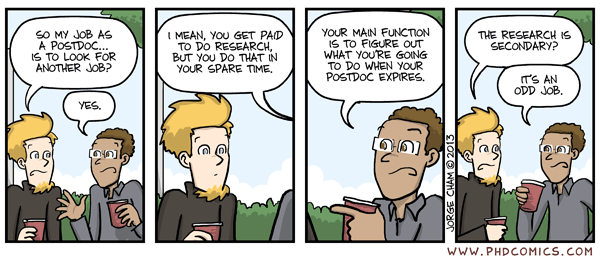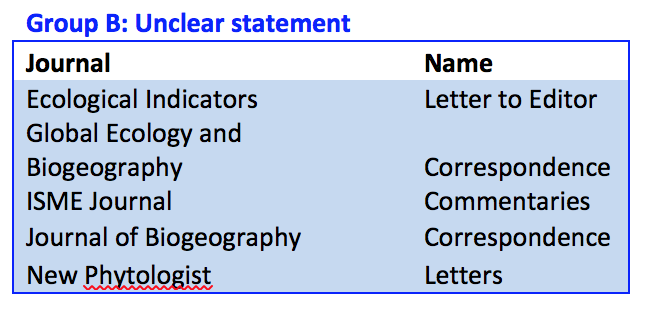Unlike grad school, postdoc positions start and end without much fanfare. If grad students are apprentices, postdocs are the journeymen/women of the trade. (
Wikipedia defines journeymen as… “considered competent and authorized to work in that field as a fully qualified employee… [but] they are not yet able to work as a self-employed master craftsman.”) Though short compared to a PhD, postdoc jobs are an important stepping stone towards a 'real' job, be that another postdoc, or a position inside or outside of academia. There’s less advice out there about being successful as a postdoc, and often you are on your own to figure things out. I’m finishing a first postdoc this week, and moving on to a second one, and while I think the last 2 years worked out well, they took their own, unexpected path. Some of this is good advice that I was given, some comes from experience or observation, some I even manage to follow :-) *
Choose carefully. If you have some choice, be strategic in choosing a postdoc job. Decide what the position is going to accomplish for you: that may be expanding your skill set, such as by learning a new experimental system or additional analytical techniques; improving your current skills by working with an expert; being involved in high profile research; or being in a certain locale for various reasons. Beware projects too far from your current skill set – the risk is that the learning curve may be so steep that you will be barely competent at the end, and have little to show for your time. Of course, you might decide to use a postdoc to pursue interdisciplinary work, or move away from your dissertation work, in which case this is a risk worth taking.
Because postdocs are short, it may seem as though having a good fit with your supervisor is less important. Don’t assume that your new supervisor be broadly similar in approach to your previous supervisor (or an improvement). Mismatched expectations between supervisors and postdocs seem pretty common and it’s important to get an understanding of what your role is beforehand. The variation in expectations from supervisor to supervisor is huge - from those that require time sheets and expect strict hours, to those that give you total autonomy. Does your supervisor see postdocs as colleagues? 9-5 employees? Advanced students? Lab managers? Talk to friends, colleagues, and students. This may depend on the source of funding as well - will you be working on a specific existing project with specific timelines (common in the US where many postdocs are funded off of NSF grants), or are you funded by a fellowship and therefore more independent?
Get to know your neighbours. Once you’ve chosen and started your postdoc, the most important thing to do is to establish connections in your lab and department immediately. I cannot emphasize this enough. Don’t wait to settle in, or get on top of some papers, or hope people in the hallway will introduce themselves. Postdoc positions are short, and in many departments postdocs are isolated, not students but not really faculty. This can lead to
feelings of disconnection, loneliness, and frustration. Seek out the other postdocs - join or organize postdoc social events, go to lab meetings and journal clubs, get the department to maintain an active postdoc email list. Not only will this give you a sense of belonging, but now you have people to talk to (and sometimes rant to), with whom to navigate administrative issues, and potential collaborators. Postdocs are an invaluable resource for job applications as well: they usually have the most up-to-date experience on the job market, and can provide great feedback on job applications and practice job talks. For example, the postdocs in my current department built an exhaustive list of potential questions asked during academic interviews, and shared interview horror stories over drinks.
Mental health and life balance. Postdocs don’t get the kinder, gentler approach sometimes given to grad students and people expect you to stand on your own. This can reignite imposter syndrome. There is no easy solution to this, but some combination of taking care of yourself, working on that mythical thick skin, and highlighting the positive events in your life can help.
Time management continues to become more important, at least for me. More than in grad school, you have to actively decide how much work you want to be doing. There is always something that you *could* be working on, so start scheduling when things will get done based on priority, energy, etc, is important. In addition, people start inviting you to things or asking for you input on projects. Learn to say no. Be strategic about your time management – it’s flattering to wanted, but time is limited and not all invitations are of equal value towards your specific goals.
Practice professional networking. On the other hand, don’t say no to everything: networking and the opportunities it creates are very helpful. Focus on the professional areas that are of interest to you, but consider joining and being active in ESA sections (including the Early Career section) or other relevant organizations; organize workshops or symposia at conferences; host invited speakers. If your department hosts an external seminar series, take advantage (nicely!) of the revolving cast of scientists. They are a great way to make connections with people whose work you admire, and even speakers you have less in common with are great practice for networking skills. From experience, if you have breakfast with a different visiting speaker every week, you will quickly improve your description of your research and your ability to keep a conversation going (also, you will become an expert on your city’s breakfast places). These are helpful skills to have for faculty interviews, for talking to the media and press, even for telling your family what you do.
Take initiative. You are your own advocate now. If you wish you could learn something, or be invited to a working group, or get teaching experience, look into making it happen yourself. This may include organizing working groups (many provide competitive funding, for example, iDiv/sDiv, CIEE (Canada), the new NCEAS, SESYNC), applying for small grants and other project funding on your own, recruiting undergraduates and mentoring them, organizing or co-teaching courses.
Similarly, don’t stop learning new things. Inertia gets higher the less time you have, and it can be hard find the time to pick up the next skill.
Publish. Focus on publishing (if you are interested in academic jobs)– this may be obvious, but publishing is more important than ever as a postdoc. You need to show that you are independently able to produce work after leaving your PhD lab. This counters the ‘maybe they just had a good supervisor’ concern. It can be hard to find time to work on both current and past projects, but try to. From experience (and illustrated by the periodic emails from my PhD supervisor), the longer your dissertation chapters sit around, the less likely they are to ever be published…
Know what your dream job is, and apply for it if you see it. Be willing to move on if something better comes up. Postdocs usually have to think in the short-term, because most funding is in 1-2 year increments. So keep an eye on new sources of funding/positions. Make decisions based on your needs (be they career-related, family-related, whatever): it’s easy to feel guilty moving on from one unfinished position to another, but the reality is that postdocs are temporary and fleeting.
I was told to start applying for jobs as early as I felt reasonably qualified. The logic was that the best practice for job interviews is doing actual job interviews, and further, it is better to fail when it doesn’t matter, rather than when it is your dream job.
 |
| well, sort of... |
*Obviously nothing is one-size-fits all, and this is mostly aimed at people who plan to apply for faculty jobs eventually. Other advice, especially for non-academic tracks, would be welcome in the comments!











